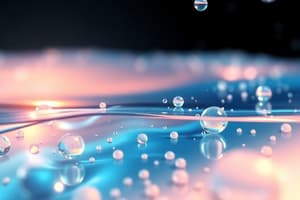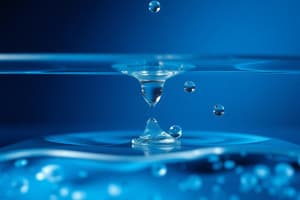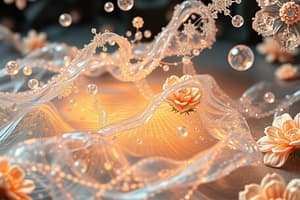Podcast
Questions and Answers
What effect do soaps and detergents have on surface tension?
What effect do soaps and detergents have on surface tension?
- They only affect surface tension at high temperatures.
- They lower surface tension. (correct)
- They have no effect on surface tension.
- They increase surface tension significantly.
At what temperature is the surface tension of water measured as 72 mN m-1?
At what temperature is the surface tension of water measured as 72 mN m-1?
- 50°C
- 0°C
- 25°C (correct)
- 100°C
Which substance listed has the lowest surface tension?
Which substance listed has the lowest surface tension?
- Ethanol (correct)
- Glycerol
- Octanol
- Mercury
What is the surface tension of mercury, as given in the values?
What is the surface tension of mercury, as given in the values?
What happens to surface tension in the presence of impurities?
What happens to surface tension in the presence of impurities?
What phenomenon causes the surface molecules of water to exhibit a 'skin' that resists puncture?
What phenomenon causes the surface molecules of water to exhibit a 'skin' that resists puncture?
What is the typical lifetime of a molecule at the surface of water?
What is the typical lifetime of a molecule at the surface of water?
What is the definition of surface tension?
What is the definition of surface tension?
What energy is required to increase the surface area of a liquid isothermally and reversibly by 1 m²?
What energy is required to increase the surface area of a liquid isothermally and reversibly by 1 m²?
How are surface tension and surface free energy related?
How are surface tension and surface free energy related?
What effect does increasing the temperature have on the surface tension of water?
What effect does increasing the temperature have on the surface tension of water?
Why is hot water considered a better cleaning agent than cold water?
Why is hot water considered a better cleaning agent than cold water?
What is the surface tension of water at 25°C?
What is the surface tension of water at 25°C?
What is defined as the transition region where two immiscible phases contact each other?
What is defined as the transition region where two immiscible phases contact each other?
Which of the following describes the phenomenon where water droplets form a spherical shape?
Which of the following describes the phenomenon where water droplets form a spherical shape?
What occurs at the liquid-liquid interface compared to the gas-liquid interface?
What occurs at the liquid-liquid interface compared to the gas-liquid interface?
Which statement about surface free energy is correct?
Which statement about surface free energy is correct?
What is the relation between particle size and surface free energy in solids?
What is the relation between particle size and surface free energy in solids?
What is the main characteristic of a surface that is different from the bulk in terms of energy?
What is the main characteristic of a surface that is different from the bulk in terms of energy?
Why are fine particles challenging to handle?
Why are fine particles challenging to handle?
Which term refers to the energy difference between the surface and bulk of a substance?
Which term refers to the energy difference between the surface and bulk of a substance?
What does the angle θ indicate when measuring contact angle for surfactants?
What does the angle θ indicate when measuring contact angle for surfactants?
In the Wilhelmy Plate method, what is the required condition for accurate measurement of surface tension?
In the Wilhelmy Plate method, what is the required condition for accurate measurement of surface tension?
Which formula correctly represents the relationship between force, perimeter, and surface tension in the Wilhelmy Plate method?
Which formula correctly represents the relationship between force, perimeter, and surface tension in the Wilhelmy Plate method?
If the force needed to detach a Wilhelmy Plate from a liquid is measured at 3 mN, and the perimeter of the plate is 0.049 m, what is the surface tension of the liquid?
If the force needed to detach a Wilhelmy Plate from a liquid is measured at 3 mN, and the perimeter of the plate is 0.049 m, what is the surface tension of the liquid?
What is the significance of a contact angle of θ < 90°?
What is the significance of a contact angle of θ < 90°?
Why is the Wilhelmy Plate method considered an absolute method?
Why is the Wilhelmy Plate method considered an absolute method?
What type of plate is typically used in the Wilhelmy Plate method?
What type of plate is typically used in the Wilhelmy Plate method?
When measuring surface tension, what can be inferred if the contact angle is θ = 90°?
When measuring surface tension, what can be inferred if the contact angle is θ = 90°?
What effect does increasing the number of –CH2 groups have on the ratio of concentration at the surface layer to that in the bulk?
What effect does increasing the number of –CH2 groups have on the ratio of concentration at the surface layer to that in the bulk?
What is the primary function of a du Nouy tensiometer?
What is the primary function of a du Nouy tensiometer?
Which type of colloidal system is an emulsion defined as?
Which type of colloidal system is an emulsion defined as?
What role do surfactants play in the formation of stable emulsions?
What role do surfactants play in the formation of stable emulsions?
Which of the following correctly describes surfactants?
Which of the following correctly describes surfactants?
How does shaking affect the emulsion of oil and water?
How does shaking affect the emulsion of oil and water?
What is the effect of increasing the carbon chain length in surfactants?
What is the effect of increasing the carbon chain length in surfactants?
What mathematical relationship is given for calculating detachment force using a du Nouy tensiometer?
What mathematical relationship is given for calculating detachment force using a du Nouy tensiometer?
What happens to the emulsion when shaking ceases?
What happens to the emulsion when shaking ceases?
Which surfactant is considered water-soluble for use in making o/w emulsions?
Which surfactant is considered water-soluble for use in making o/w emulsions?
In regard to surfactant behavior, what is Traube’s rule relevant to?
In regard to surfactant behavior, what is Traube’s rule relevant to?
What is required for accurate surface tension measurements using the du Nouy tensiometer?
What is required for accurate surface tension measurements using the du Nouy tensiometer?
What is the primary characteristic of the complex stable film formed by surfactants?
What is the primary characteristic of the complex stable film formed by surfactants?
Which of the following best describes the hydrophobic group in surfactants?
Which of the following best describes the hydrophobic group in surfactants?
Flashcards
Surface tension
Surface tension
The force that holds the surface molecules of a liquid together, resulting in a tension-like effect.
Surfactant
Surfactant
A substance that lowers surface tension by reducing the cohesive forces between liquid molecules. They have both hydrophilic and hydrophobic parts.
Surface tension of water
Surface tension of water
Water molecules have strong cohesive forces due to hydrogen bonding, resulting in a high surface tension.
Hydrophobic
Hydrophobic
Signup and view all the flashcards
Hydrophilic
Hydrophilic
Signup and view all the flashcards
Surface Free Energy
Surface Free Energy
Signup and view all the flashcards
Surface Tension and Surface Free Energy Relationship
Surface Tension and Surface Free Energy Relationship
Signup and view all the flashcards
Symbol for Surface Tension/Free Energy
Symbol for Surface Tension/Free Energy
Signup and view all the flashcards
Surface Tension and Temperature
Surface Tension and Temperature
Signup and view all the flashcards
Inward Pull on Surface Molecules
Inward Pull on Surface Molecules
Signup and view all the flashcards
Interface
Interface
Signup and view all the flashcards
Interfacial Tension
Interfacial Tension
Signup and view all the flashcards
Minimizing Surface Area
Minimizing Surface Area
Signup and view all the flashcards
Increased Surface Area and Reactivity
Increased Surface Area and Reactivity
Signup and view all the flashcards
Energy Required for Surface Area Increase
Energy Required for Surface Area Increase
Signup and view all the flashcards
Adhesion
Adhesion
Signup and view all the flashcards
Du Nouy Tensiometer
Du Nouy Tensiometer
Signup and view all the flashcards
Du Nouy Tensiometer Equation
Du Nouy Tensiometer Equation
Signup and view all the flashcards
Amphipathic
Amphipathic
Signup and view all the flashcards
Hydrophobic Group
Hydrophobic Group
Signup and view all the flashcards
Hydrophilic Group
Hydrophilic Group
Signup and view all the flashcards
Surfactant Orientation
Surfactant Orientation
Signup and view all the flashcards
Surfactant Structure
Surfactant Structure
Signup and view all the flashcards
Contact Angle
Contact Angle
Signup and view all the flashcards
Absolute Wetting
Absolute Wetting
Signup and view all the flashcards
No wetting
No wetting
Signup and view all the flashcards
Wilhelmy Plate Method
Wilhelmy Plate Method
Signup and view all the flashcards
Force of Surface Tension
Force of Surface Tension
Signup and view all the flashcards
Complete Wetting Condition
Complete Wetting Condition
Signup and view all the flashcards
Static Mode of Wilhelmy Plate Method
Static Mode of Wilhelmy Plate Method
Signup and view all the flashcards
Adsorption of Surfactants
Adsorption of Surfactants
Signup and view all the flashcards
Lowering Surface Tension
Lowering Surface Tension
Signup and view all the flashcards
Emulsion
Emulsion
Signup and view all the flashcards
Emulsifying Agent
Emulsifying Agent
Signup and view all the flashcards
Stable Emulsion Formation
Stable Emulsion Formation
Signup and view all the flashcards
Phase Separation
Phase Separation
Signup and view all the flashcards
Interfacial Free Energy
Interfacial Free Energy
Signup and view all the flashcards
Dynamic Equilibrium in Emulsions
Dynamic Equilibrium in Emulsions
Signup and view all the flashcards
Study Notes
MPharm Programme: Surface Tension & Surfactants
- This programme covers surfactants and their use in pharmaceutical preparations.
- Surface tension is the force acting parallel to the surface and at right angles to a 1m line drawn anywhere in the surface.
- Surface tension is measured in mN m⁻¹.
- Water's surface tension is 72 mN m⁻¹ at 25°C and decreases with temperature.
- Interfaces are the transition regions where two immiscible phases meet.
- Examples of interfaces include: liquid-vapour, liquid-liquid, solid-liquid, solid-vapour, and solid-solid.
- Surface tension is an inward force that causes the surface to contract.
- Surface molecules have higher energy than bulk molecules due to the unequal attractive forces.
- Reducing surface area minimizes surface free energy.
- Water droplets are spherical due to the minimization of surface area.
- Solids can't readily change shape when surface free energy is high.
- Increasing surface area (e.g., milling solids) increases surface free energy.
- To increase surface area, energy must be supplied (e.g., emulsion formation).
- Wetting is the ability of a liquid to spread on a solid surface and is influenced by contact angle. A contact angle of 0° indicates complete wetting, while an angle of 180° indicates no wetting.
- Surfactants are amphipathic molecules with both hydrophilic (water-loving) and hydrophobic (water-fearing) regions.
- Surfactants have hydrophobic tails (like hydrocarbon chains) and hydrophilic heads which contain a charged functional group.
- This dual nature allows surfactants to adsorb at liquid-liquid or liquid-solid interfaces.
- Traube's rule states that for homologous alcohols, the ratio of surface concentration to bulk concentration increases approximately threefold for every additional -CH2 group in the chain length.
- Surfactants lower surface tension, making them useful emulsifying agents, detergents, solubilizing agents, wetting agents, foaming agents, and antifoaming agents, and flocculating agents.
- Emulsions are colloidal systems of two immiscible liquids, often water and oil.
- These systems use emulsifiers (surfactants) to stabilize the emulsion.
Measurement of Surface Tension
- Methods include the Wilhelmy plate and du Nouy ring methods.
- Wilhelmy plate: A thin plate dipped into the liquid, with force measured as it's pulled out. Surface tension is calculated with the force divided by the plate's perimeter.
- du Nouy ring: Force to detach a platinum ring from the liquid is measured. Surface tension is calculated from the detachment force and ring perimeter.
- Both require zero contact angles for accurate measurements.
- Correction factors may be needed depending on the method and specific situation (e.g., for non-vertical force).
Calculation Example
- A calculation example using the Wilhelmy plate method shows how to find surface tension values from measured force and perimeter parameters. (e.g., for a given liquid and plate dimensions)
Studying That Suits You
Use AI to generate personalized quizzes and flashcards to suit your learning preferences.




